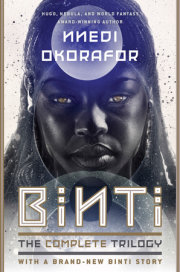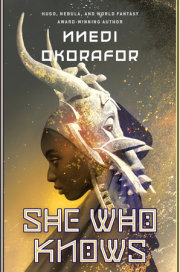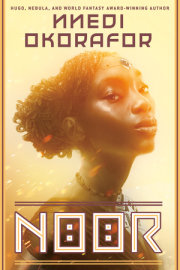I powered up the transporter and said a silent prayer.
I had no idea what I was going to do if it didn’t work. My transporter was cheap, so even a droplet of moisture, or more likely, a grain of sand, would cause it to short. It was faulty and most of the time I had to restart it over and over before it worked.
Please not now, please not now, I thought.
The transporter shivered in the sand and I held my breath.
Tiny, flat, and black as a prayer stone, it buzzed softly and then slowly rose from the sand. Finally, it produced the baggage-lifting force. I grinned. Now I could make it to the shuttle. I swiped otjize from my forehead with my index finger and knelt down. Then I touched the finger to the sand, grounding the sweet smelling red clay into it. “Thank you,” I whispered.
It was a half-mile walk along the dark desert road. With the transporter working, I would make it there on time.
Straightening up, I paused and shut my eyes. Now the weight of my entire life was pressing on my shoulders. I was defying the most traditional part of myself for the first time in my entire life.
I was leaving in the dead of night and they had no clue. My nine siblings, all older than me except for my younger sister and brother, would never see this coming. My parents would never imagine I’d do such a thing in a million years. By the time they all realized what I’d done and where I was going, I’d have left the planet. In my absence, my parents would growl to each other that I was to never set foot in their home again. My four aunties and two uncles who lived down the road would shout and gossip among themselves about how I’d scandalized our entire bloodline. I was going to be a pariah.
“Go,” I softly whispered to the transporter, stamping my foot. The thin metal rings I wore around each ankle jingled noisily, but I stamped my foot again. Once on, the transporter worked best when I didn’t touch it. “Go,” I said again, sweat forming on my brow. When nothing moved, I chanced giving the two large suitcases sitting atop the force field a shove. They moved smoothly and I breathed another sigh of relief. At least some luck was on my side.
Fifteen minutes later I purchased a ticket and boarded the shuttle. The sun was barely beginning to peak over the horizon. As I moved past seated passengers far too aware of the bushy ends of my plaited hair softly slapping people in the face, I cast my eyes to the floor. Our hair is thick and mine has always been very thick. My old auntie liked to call it “ododo” because it grew wild and dense like ododo grass. Just before leaving, I’d rolled my plaited hair with fresh sweet- smelling otjize I’d made specifically for this trip. Who knew what I looked like to these people who didn’t know my people so well.
A woman leaned away from me as I passed, her face pinched as if she smelled something foul. “Sorry,” I whispered, watching my feet and trying to ignore the stares of almost everyone in the shuttle. Still, I couldn’t help glancing around. Two girls who might have been a few years older than me, covered their mouths with hands so pale that they looked untouched by the sun. Everyone looked as if the sun was his or her enemy. I was the only Himba on the shuttle. I quickly found and moved to a seat.
The shuttle was one of the new sleek models that looked like the bullets my teachers used to calculate ballistic coefficients during my A‑levels when I was growing up. These ones glided fast over land using a combination of air current, magnetic fields, and exponential energy— an easy craft to build if you had the equipment and the time. It was also a nice vehicle for hot desert terrain where the roads leading out of town were terribly maintained. My people didn’t like to leave the homeland. I sat in the back so I could look out the large window.
I could see the lights from my father’s astrolabe shop and the sand storm analyzer my brother had built at the top of the Root—that’s what we called my parents’ big, big house. Six generations of my family had lived there. It was the oldest house in my village, maybe the oldest in the city. It was made of stone and concrete, cool in the night, hot in the day. And it was patched with solar planes and covered with bioluminescent plants that liked to stop glowing just before sunrise. My bedroom was at the top of the house. The shuttle began to move and I stared until I couldn’t see it anymore. “What am I doing?” I whispered.
An hour and a half later, the shuttle arrived at the launch port. I was the last off, which was good because the sight of the launch port overwhelmed me so much that all I could do for several moments was stand there. I was wearing a long red skirt, one that was silky like water, a light orange wind- top that was stiff and durable, thin leather sandals, and my anklets. No one around me wore such an outfit. All I saw were light flowing garments and veils; not one woman’s ankles were exposed, let alone jingling with steel anklets. I breathed through my mouth and felt my face grow hot.
“Stupid stupid stupid,” I whispered. We Himba don’t travel. We stay put. Our ancestral land is life; move away from it and you diminish. We even cover our bodies with it. Otjize is red land. Here in the launch port, most were Khoush and a few other non-Himba. Here, I was an outsider; I was outside. “What was I thinking?” I whispered.
I was sixteen years old and had never been beyond my city, let alone near a launch station. I was by myself and I had just left my family. My prospects of marriage had been 100 percent and now they would be zero. No man wanted a woman who’d run away. However, beyond my prospects of normal life being ruined, I had scored so high on the planetary exams in mathematics that the Oomza University had not only admitted me, but promised to pay for whatever I needed in order to attend. No matter what choice I made, I was never going to have a normal life, really.
I looked around and immediately knew what to do next. I walked to the help desk.
Copyright © 2019 by Nnedi Okorafor. All rights reserved. No part of this excerpt may be reproduced or reprinted without permission in writing from the publisher.












